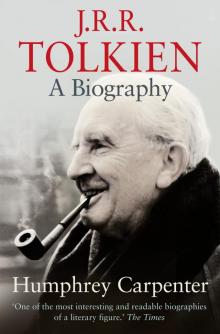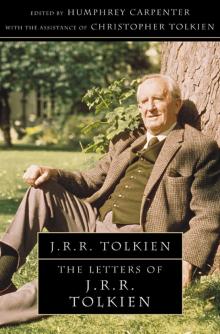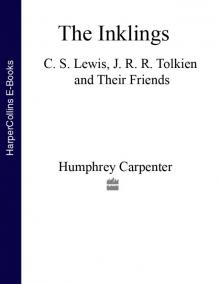- Home
- Humphrey Carpenter
The Inklings Page 2
The Inklings Read online
Page 2
Yet his own life now was remarkably unscarred. Placid days succeeded one another. He read Homer under Kirkpatrick’s tuition, he walked in the Surrey countryside, he wrote poetry, and he sent for innumerable parcels of books from London shops. ‘How one does want to read everything,’ he remarked to Arthur Greeves, and soon there was little in English literature that he had not encountered. For an atheist, he found delight in unlikely places. Of Malory’s account of the Grail he remarked to Greeves, ‘Those mystic parts are very good to read late at night when you are drowsy and tired and get into a sort of “exalted” mood.’ And when he discovered George MacDonald’s ‘faery’ novel Phantastes on a station bookstall he declared that reading it was ‘a great literary experience’. Meanwhile his progress at academic work was good; indeed it was clear that he was suited for an academic career – and for that only. ‘While admirably adapted for excellence,’ Kirkpatrick wrote to Lewis’s father, ‘and probably for distinction in literary matters, he is adapted for nothing else. You may make up your mind on that.’
At the end of 1916 Jack Lewis won a scholarship to University College, Oxford.
*
It was the summer of 1917. Lewis’s first term as an Oxford undergraduate had been interrupted, not unexpectedly, by his call-up papers, and he was now a cadet in uniform. His battalion was quartered just down the road, in Keble College. Cadets were billeted two to a set of rooms, and the allocations were made in alphabetical order. As a result, Lewis C. S. found himself sharing sleeping quarters with Moore E. F. C. Many years later, Jack Lewis’s brother remarked in his diary, ‘Lewis and Moore: it might just as easily have been Lewis and Sergeant Muggins, or Lewis and Lord Molineux, and the very fact would have been forgotten by now – but it was Lewis and Moore, and when the clerk filled in the names he permanently and almost immediately altered the course of several lives.’
Jack Lewis did not particularly care for his room-mate; he found ‘Paddy’ Moore rather childish. But Paddy’s mother, an Irishwoman who had been separated from her husband for many years, was living in lodgings close by, so as to be near her son; and when they met she and Jack got on very well, so well that he was soon spending week-ends in her company. Later, when he got a month’s leave, he stayed for most of it with the Moores at their Bristol home, going home to his father in Belfast only for the final few days. His father was surprised and hurt at this division of Jack’s time.
Once or twice there had already been incipient romances in Jack’s life. During his Surrey days he had been attracted to a Belgian refugee girl who was staying in the neighbourhood, and had talked about her in his letters to Arthur Greeves – ‘I don’t think I’ve ever been so bucked about anything in my life, she’s an awfully decent sort.’ Later, in his first few months at Oxford, he had been very friendly with a young woman from Belfast, who was in the city with her mother. But before any real romance could begin he met Mrs Janie Moore.
She was aged forty-five, Irish, and lively. She was poorly educated and her conversation was largely illogical nonsense, so in this respect she was a very odd friend for Jack; but something made him enjoy her company. Perhaps it was in large part simply the fact that she made him feel at home. He was never at ease at his real home in Belfast; his father lived according to an enervating daily routine, and was also perpetually inquisitive into his sons’ lives. This made Warnie and Jack draw apart from their parent. Now, when Jack’s military training was over and he was about to embark for the front line in France, he telegraphed to his father asking him to come over to England and say goodbye. His father, typically failing to understand the telegram, did not come. It was little wonder that Jack turned to Mrs Moore for affection.
By the time that Jack left for France he and Mrs Moore were behaving to each other like mother and son. As for the real son, Jack once remarked (years later, to his brother) that Mrs Moore and Paddy ‘hadn’t got on at all well’. In the spring of 1918, Paddy was reported missing in action, and when his death was officially confirmed Mrs Moore wrote to Lewis’s father that Paddy had asked Jack ‘to look after me if he did not come back’. This became the public explanation for what followed, but probably Jack would have looked after her whether Paddy had come back or not.
*
Jack Lewis’s time in the trenches was short, and though he found it horrific he was not deeply shaken by the experience. He had, after all, lived with the knowledge of the war for more than three years before going out to the front line himself. It was something he knew he would have to endure, and (unlike public school) nobody expected him to like it. When he finally reached the front line he found that it was as bad as he had anticipated, but no worse.
Certainly he would always remember what he described as ‘the horribly smashed men still moving like half-crushed beetles, the sitting or standing corpses’. And just once he put something of this into his poetry:
‘What, brother, brother,
Who groaned?’ – ‘I’m hit. I’m finished. Let me be.’
– ‘Put out your hand, then. Reach me. No, the other.’
– ‘Don’t touch. Fool! Damn you! Leave me.’ – ‘I can’t see.
Where are you?’ Then more groans. ‘They’ve done for me.
I’ve no hands. Don’t come near me. No, but stay,
Don’t leave me … O my God! Is it near day?’
(These lines are from his narrative poem Dymer, written not long after the war.) Lewis himself was wounded by a shell a few months after going into the front line. But when he came to write an autobiography he devoted three heated chapters to the horrors of public school and only part of one – entitled ‘Guns and Good Company’ – to his war experiences. Two remarks about the war, in that book, sum up his attitude. After recording his memories of the animal horror of the trenches, he says: ‘It is too cut off from the rest of my experience and often seems to have happened to someone else.’ The other remark describes his response to hearing for the first time the whine of a bullet: ‘At that moment there was something not exactly like fear, much less like indifference: a little quavering signal that said, “This is War. This is what Homer wrote about.”’
*
When Jack Lewis was sent home wounded from the trenches in the spring of 1918, Mrs Moore came to London to be near his hospital. Later, he chose to convalesce in Bristol where she lived. After he had recovered and had re-entered army life, she spent the rest of the war following him from camp to camp, setting up temporary homes as near to him as possible. And when in the autumn of 1918 the war ended and he went back to Oxford as an undergraduate, she packed up her house in Bristol and came too.
They found a furnished house in Warneford Road in east Oxford, and shared the rent between them, Jack making use of an allowance from his father and Mrs Moore depending chiefly on money from her estranged husband, whom she called ‘the Beast’. Officially, Jack was living in University College where he was an undergraduate reading Classics, but in reality he spent as much time as possible in ‘our hired house’, as he described it. ‘After lunch,’ he told Arthur Greeves, ‘I work until tea, then work again until dinner. After that, a little more work, talk and laziness and sometimes bridge, then bicycle back to College at 11.I then light my fire and work or read till 12 o’clock when I retire to sleep the sleep of the just.’ This may have been his routine on an ideal day, but more often his time at Warneford Road was occupied with one of the innumerable domestic chores which Mrs Moore was in the habit of devising for him: helping her to make jam and marmalade, scrubbing the floors, washing up, walking the dog, mending broken furniture, taking messages and doing shopping errands. It was not that she did not try to do any of these things herself, but she was easily exhausted – or at least Jack believed that she was – and, though they were generally able to afford a maid, Mrs Moore was suspicious of servants and did not like to trust the girl with these tasks. She used to say of Jack, ‘He is as good as an extra maid.’ As for Jack, he developed the ability to work at his desk in the middl
e of domestic mayhem. Only a few minutes would pass in an afternoon at Warneford Road without Mrs Moore’s strident voice summoning him to some job or other; he would lay down his pen patiently, go and do what was wanted (however trivial) and then come back and resume work as if nothing had happened. He called this ‘the hopeless business of trying to save D. from overwork’. ‘D.’ was how he referred to Mrs Moore in his diary; to other people he called her ‘Minto’. Both names are inexplicable.
Remarkably, this disturbed way of life did no harm to his studies. Long before, in Surrey days, his tutor Kirkpatrick had reported to Jack’s father, ‘He has read more classics than any boy I ever had – or indeed I might add than any I ever heard of, unless it be an Addison or Landor or Macaulay.’ Kirkpatrick had also said of Jack’s enthusiasm for his work, ‘He is a student who has no interest except in reading and study. The very idea of urging him or stimulating him to increased exertion makes me smile.’ Nevertheless, given the distractions of life with ‘Minto’, Jack Lewis did very well to take a First Class in Classical Moderations in March 1920.
Meanwhile his friends and relatives were puzzling over his strange involvement with Mrs Moore. It was easy to explain the mother—son element in it by the losses of real mother and real son which they had suffered. But was that all? Some people perhaps suspected a romantic-sexual element in the liaison, and possibly this was what Jack’s father had in mind when he referred to it as ‘Jack’s affair’. This sort of speculation was, if anything, fostered by the silence of Jack himself, who refused to discuss the matter with any of his close friends. On the only occasion Warnie Lewis asked his brother about the relationship he was told to mind his own business. In particular Jack tried to keep his father as much in the dark about it as possible, pretending to him that he was living in ordinary ‘digs’ with other undergraduates, and disguising a holiday spent with ‘Minto’ as a walking tour with a college friend. None of this helped to make it seem entirely respectable.1
On the other hand nobody who knew Jack Lewis supposed seriously that Mrs Moore was his mistress. Certainly he discussed sex in his letters to Arthur Greeves, but only in relation to masturbation, and this was probably all that he meant by the rather veiled and arch references he made (in the books he was later to write) to his sexual experience as a young man. On the practical level, a sexual relationship with Mrs Moore would have been difficult without servants’ gossip, let alone the fact that another member of the household was Mrs Moore’s daughter Maureen, who was eight years younger than Paddy and still a child.
After this strange ménage had been established in Oxford for a little over a year, Jack was able to move out of college and make the home with ‘Minto’ his official lodgings. But they were obliged to leave the Warneford Road house, and there began a long search for a permanent home in which they could use Mrs Moore’s own furniture. Unfurnished houses at a moderate rent seemed impossible to find, and for two long years they moved from one place to another, renting furnished rooms or being lent the use of a house for a few weeks while the owner was away. Between 1918 and 1923 they lived at nine different addresses, ‘most of them vile’, as Jack remarked in his diary. At one time during this period Mrs Moore told him that ‘she was quite convinced that she would never again live in a house of her own’.
*
Until 1918 Jack Lewis had gone on writing poems that were deeply pessimistic, flinging accusations at a cruel God. They were not particularly good as poetry, so he was lucky to have a volume of them published by Heinemann in 1918 under the title Spirits in Bondage. They attracted almost no attention, and Lewis brought no reputation as a poet when he came up to Oxford. Indeed, tastes were already changing, and he discovered that many of his fellow undergraduates who were interested in poetry admired T. S. Eliot and other exponents of modern verse. ‘I’m afraid I shall never be an orthodox modern,’ Lewis wrote to Arthur Greeves in October 1918. ‘I like lines that will scan and do not care for descriptions of sea-sickness.’
He was not alone in disliking modern verse: he soon made friends with several other undergraduates who shared his views, and who (like him) wanted to go on writing poetry uninfluenced by the new movement. Among these was a young man at Wadham College, Owen Barfield. He and Lewis and several others conceived the rather grand idea of issuing a yearly collection of their verses; but this idea petered out. However, they continued to read each other’s poetry with interest, and to offer criticisms.
By the time that Lewis began to read for the second part of the Classics course, ‘Greats’ (Ancient History and Philosophy), he had abandoned the pessimistic viewpoint of his early poems. He also decided to turn his back on the sensations of delight that he had received from Norse mythology, Malory, George MacDonald, and many other books. Privately he still sometimes felt such sensations, though not so often as before; but these he now labelled ‘aesthetic experience’ and said that they were valuable but not really informative. As to the existence of God, he adopted the attitude that ‘it really made no difference whatever whether there was such a person or no’. All this he called his New Look. It certainly harmonised with the Oxford approach to philosophy at the time; the ruthlessly analytical Logical Positivism had not yet made its appearance, but there was a prevailing tone of scepticism which Lewis gladly adopted.
In 1922 he took a First Class in ‘Greats’.
*
Shortly after this, he and Mrs Moore finally found a house that offered a hope of permanence, ‘Hillsboro’, a villa in the Oxford suburb of Headington which was available as an unfurnished letting. Out came Mrs Moore’s furniture from store; Jack spent endless days painting and laying linoleum; and they moved in. This, however, did not mean domestic tranquillity, for ‘Minto’ still found more than enough for Jack to do, partly thanks to her habit of quarrelling with servants. Jack noted in his diary that the incompetence of one maid had become ‘the exclusive subject of conversation’ with Mrs Moore, remarking, ‘I do not blame D. for this in the least, but of course it makes things very miserable.’
Jack now hoped for a teaching appointment at Oxford. But there were no university jobs available in Philosophy, his strong subject in ‘Greats’; so, as his father was good-naturedly prepared to continue financial support for a time, he decided to read English Language and Literature, tackling the full course in just one year, a mere third of the time that most undergraduates devoted to it. This meant learning Anglo-Saxon and studying the principles of philology, besides reading literature from the medieval period to the nineteenth century. He was, of course, far from ignorant in this field already, but there was still a lot of ground to cover, and it was amazing that he managed to do it in the moments he could spare from domestic life. During the months while he was racing through the English syllabus he was teaching Latin to Mrs Moore’s daughter Maureen and to her music-mistress in lieu of Maureen’s fees, tutoring a neighbour’s child in return for Maureen’s lessons with its mother, and washing up after almost every meal. For two weeks he was, by day and night, looking after Mrs Moore’s brother, who was having a severe nervous breakdown in the house. He was also coping with a perpetual series of what he called ‘Minto’s mare’s nests’ – imaginary crises of every conceivable kind – and with a stream of visitors and paying guests. The most remarkable thing was that he did this with almost unvarying good humour. This was perhaps partly because he knew that the whole thing was very nearly his fault anyway, and if he complained it could be justly retorted that the household owed its existence to him. But really it was his immense fund of good nature that kept him going. He was already practised at coping with domestic oddities, thanks to the strangeness of family life with his father in Belfast; and in any case he was not a complainer by nature. Far from it: he derived immense amusement from the odd visitors who came to the house, to whom he and Mrs Moore gave nicknames: ‘the Blackguard’ for a grotesque French lodger, and ‘Smudge’ for the inoffensive and rather indistinct music teacher. Only when the question was raised of his
brother Warnie coming to live with them did Jack warn him openly of ‘the perpetual interruptions of family life – the partial loss of liberty’. And even then he qualified it by adding: ‘This sounds as if I were either sick of it myself or else trying to make you sick of it: but neither is the case. I have definitely chosen and don’t regret the choice. Whether I was right or wrong, wise or foolish, to have done so originally, is now only an historical question: once having created expectations, one naturally fulfils them.’
*
He was not very impressed by his first experiences when reading English Language and Literature at Oxford. ‘The atmosphere of the English school’, he wrote in his diary after attending a lecture, ‘is very different from that of Greats. Women, Indians, and Americans predominate and – I can’t say how – one feels a certain amateurishness in the talk and look of the people.’ He thought poorly of many of the lectures, and felt no enthusiasm for the study of philological niceties such as glottal stops and vowel shifts, of which he remarked, ‘Very good stuff in its way, but why physiology should form part of the English school I really don’t know.’ He was comfortable, however, in the company of the Martlets, the literary society of University College, which met to listen to papers read by its members. Lewis often contributed monographs on his favourite authors. He gave a talk on William Morris and another on Spenser. After the paper there would be a discussion, which sometimes turned into intellectual pyrotechnics; for like Lewis many of the Martlets were well read in philosophy. They enjoyed showing off their command of logic, as did Lewis, for he believed that his mind was well trained in argument. He was always in the forefront of any dialectical battle that concluded a Martlets evening, and he also liked to go for brisk walks with fellow members, during which they would continue an intricate argument from the previous Martlets meeting. This kind of talk was often an intellectual duel for the sake of the sport, and Lewis judged his and his opponent’s performance as much on method as on content. ‘In spite of many well contested points I was gravelled in the end,’ he recorded after one such contest which was conducted while he and a friend strode across the meadows on the edge of Oxford, adding, ‘We were neither of us in really good dialectical form.’

 J. R. R. Tolkien
J. R. R. Tolkien Mr Majeika and the School Caretaker
Mr Majeika and the School Caretaker Mr Majeika Joins the Circus
Mr Majeika Joins the Circus Mr Majeika on the Internet
Mr Majeika on the Internet Mr Majeika and the Ghost Train
Mr Majeika and the Ghost Train Mr Majeika and the Lost Spell Book
Mr Majeika and the Lost Spell Book Mr Majeika and the School Book Week
Mr Majeika and the School Book Week The Letters of J.R.R. Tolkien
The Letters of J.R.R. Tolkien Mr Majeika and the School Inspector
Mr Majeika and the School Inspector Mr Majeika and the Music Teacher
Mr Majeika and the Music Teacher The Inklings
The Inklings Mr Majeika and the School Trip
Mr Majeika and the School Trip Mr Majeika and the Dinner Lady
Mr Majeika and the Dinner Lady Mr Majeika and the School Play
Mr Majeika and the School Play